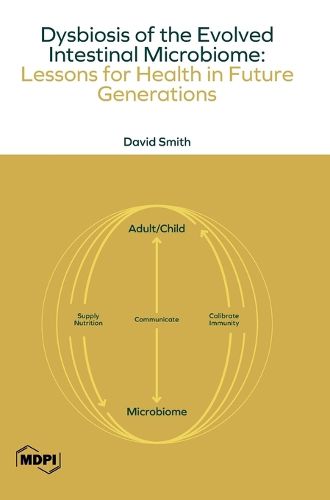Readings Newsletter
Become a Readings Member to make your shopping experience even easier.
Sign in or sign up for free!
You’re not far away from qualifying for FREE standard shipping within Australia
You’ve qualified for FREE standard shipping within Australia
The cart is loading…






This title is printed to order. This book may have been self-published. If so, we cannot guarantee the quality of the content. In the main most books will have gone through the editing process however some may not. We therefore suggest that you be aware of this before ordering this book. If in doubt check either the author or publisher’s details as we are unable to accept any returns unless they are faulty. Please contact us if you have any questions.
While it is clearly recognised that many non-communicable disorders are related to a disturbed microbiome (commonly called dysbiosis, a shortened term for microbiome failure: dysmicrobiosis), there is an absence of widely accepted underlying theories. The aim of this book is to show that all such disorders, be they weight gain, immune system disturbance, or poor mental health, stem from a single underlying problem: the failure to transfer key intestinal microbes from the mother to the new-born during birth. Furthermore, in contrast to the normal, exclusively bacterial approach, the book describes what might be called a "second generation" approach to the microbiome, that emphasises beneficial microeukaryotes acting to coordinate diverse bacterial functionality. Most importantly, lessons have been drawn to guide future research, the aim being to reintroduce these key microbes at the time of birth, alongside breast milk (bank milk if necessary) and before the immune system of the infant is fully established. If all goes as expected, not only can the present "triple plagues" of non-communicable disease be ameliorated more efficiently, but it should also be possible to banish such disease from future populations. Unfortunately, however, beneficial microeukaryotes will be hard to detect, while resistance-inducing oral antibiotics must be limited.
$9.00 standard shipping within Australia
FREE standard shipping within Australia for orders over $100.00
Express & International shipping calculated at checkout
Stock availability can be subject to change without notice. We recommend calling the shop or contacting our online team to check availability of low stock items. Please see our Shopping Online page for more details.
This title is printed to order. This book may have been self-published. If so, we cannot guarantee the quality of the content. In the main most books will have gone through the editing process however some may not. We therefore suggest that you be aware of this before ordering this book. If in doubt check either the author or publisher’s details as we are unable to accept any returns unless they are faulty. Please contact us if you have any questions.
While it is clearly recognised that many non-communicable disorders are related to a disturbed microbiome (commonly called dysbiosis, a shortened term for microbiome failure: dysmicrobiosis), there is an absence of widely accepted underlying theories. The aim of this book is to show that all such disorders, be they weight gain, immune system disturbance, or poor mental health, stem from a single underlying problem: the failure to transfer key intestinal microbes from the mother to the new-born during birth. Furthermore, in contrast to the normal, exclusively bacterial approach, the book describes what might be called a "second generation" approach to the microbiome, that emphasises beneficial microeukaryotes acting to coordinate diverse bacterial functionality. Most importantly, lessons have been drawn to guide future research, the aim being to reintroduce these key microbes at the time of birth, alongside breast milk (bank milk if necessary) and before the immune system of the infant is fully established. If all goes as expected, not only can the present "triple plagues" of non-communicable disease be ameliorated more efficiently, but it should also be possible to banish such disease from future populations. Unfortunately, however, beneficial microeukaryotes will be hard to detect, while resistance-inducing oral antibiotics must be limited.